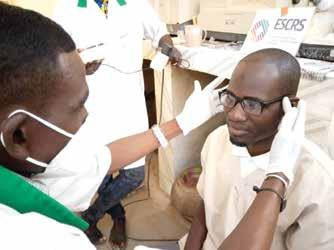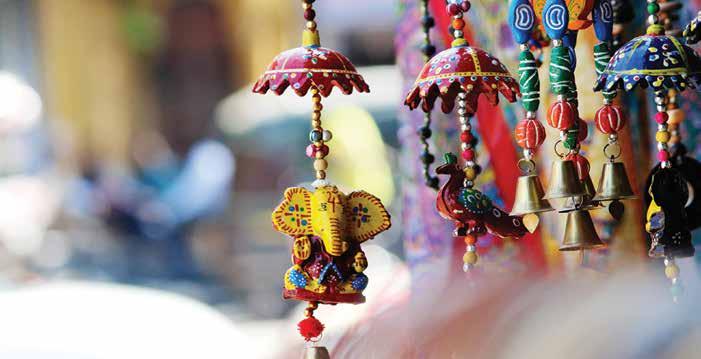
4 minute read
Continuing care in a
Soap and water basins for the use of patients at the Koro Reference Health Centre
Continuing vital care during the pandemic
©Eyes of the world foundation
ESCRS-supported charity working to eliminate avoidable blindness in under-developed countries. Priscilla Lynch reports
The impact of the COVID-19 pandemic continues to be wide-ranging and pervasive, including on the vital work of ophthalmology charity services in the developing world.
Eyes of the World, which receives support from the European Society of Cataract and Refractive Surgeons (ESCRS), is a non-profit organisation that works to eliminate avoidable blindness, through helping visually impaired people without economic resources living in some of the world’s most under-developed countries.
The foundation’s key focus involves providing long-term support to ensure that people receive qualified ophthalmological care from their local health services, at basic preventative and early diagnosis levels to specialised care.
Expert ophthalmology care, specialised training, equipment provision and local public educational and awareness campaigns are among the key supports provided by Eyes of the World to help reduce pathological ocular incidence and create sustainable qualified ophthalmology services in each region.
The foundation also works at increasing global public awareness about the basic healthcare deficiencies in these areas.
ESCRS has provided important support to the foundation in recent years, most notably with its projects in Mali and Mozambique.
Since 2008 the Foundation has been providing eye care and support in the Mopti region in Mali, which has more than two million inhabitants and only a couple of ophthalmologists, under its Eyes of Mali programme. As a result of the lack of available care, it is estimated that more than 22,000 people are blind due to preventable causes or have curable eye conditions in this area.
Delivery of protective material to the ophthalmology team of the Koro Reference Health Centre

Similarly, the Eyes of Mozambique programme, started in 2002, is based in the south of the country in the Inhambane province, where there is a huge shortage of qualified ophthalmology professionals. There are almost 100,000 blind people and about 876,000 people with ocular problems, mostly due to corneal pathologies, glaucoma, trachoma, malnutrition and degenerative illnesses.
Some of the most notable recent results of the Mozambique project are the performance of 900 cataract operations by local ophthalmologists in a year, and the screening of more than 30,000 students from schools in the province of Inhambane, the foundation told Eurotimes.
Clearly maintaining and continuing its work in these countries despite COVID-19 is absolutely vital.
Speaking to Eurotimes, Núria Ramon i Garcia, General Manager of the Eyes of the World foundation, gave an update on both of these projects and the challenges they have faced because of the pandemic.
“Fortunately, after a few extremely complicated months due to restrictions on people’s access to health centres, the Eyes of the World project in Mozambique is functioning normally again. Consultation rooms have been fully opened and surgeries are being performed again. For this same month of October, we have planned a cataract surgery campaign in the district of Zabala. In addition, we have already resumed the training of 25 PMTs (Practitioners of Traditional Medicine).
“In Mali, all the purchases of prevention and protection materials and equipment foreseen in the project have already been made and the distribution of the last batch among the different health centres in the region is being carried out. Despite the
Optical care at the Bankass Reference Health Centre

absence of data from the Koro district, Eyes of the World, with the support of the ESCRS, has already managed to attend 519 cases of eye emergencies (252 men, 182 women and 85 children under 14 years of age) and to realise 472 teleconsultations (241 men, 191 women and 40 children under 14 years of age).”
The contribution of ESCRS has been key to facilitating the safe care of urgent ophthalmic cases in these vulnerable and remote regions during the pandemic, Ms Ramon said. “That is people who otherwise would not have had any opportunity to receive treatment or eye care.”
“As for Mali, the support of ESCRS has made it possible for professionals in the region of Mopti, as well as patients, to have had the materials and equipment for the prevention of COVID-19 necessary for eye care. In this sense, all the ophthalmology units in the region have been strengthened, including the Sominé Dolo Hospital.”
She said that the continuing ESCRS support to the foundation is essential to ensure the eye care of the populations of Mali and Mozambique.
“Although thanks to the Eyes of the World projects and the support of our partners, the Mopti region (Mali) and the province of Inhambane (Mozambique) have ophthalmic care, there are still many needs to be covered; for instance: the training of more health personnel, the provision of equipment for eye health structures and the increasing of the quality and the ration of the cataract surgery, reaching the population of the most remote areas.
“Moreover, it is necessary to continue working with communities in order to raise awareness of eye hygiene and eye care guidelines; and to reach all schools to detect possible eye diseases at an early stage.” For more information and to support Eyes of the World go to www.eyesoftheworldfoundation.org
INDIA







